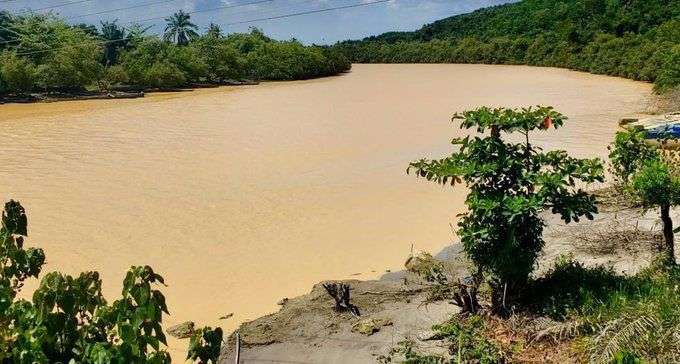Illegal mining, known locally as “galamsey,” remains one of Ghana’s most pressing environmental and socio-economic challenges. Despite ongoing efforts to curb the menace, the situation continues to deteriorate, prompting various stakeholders to raise their voices in concern.
Most recently, the Ghana United Nations Association (GUNA) has expressed deep alarm over the increasing devastation caused by illegal mining. In a press release signed by Selaasie Lhal Hiadzi, Director of Administration, GUNA called for urgent, coordinated action to address the destructive impacts of galamsey on Ghana’s environment, economy, and public health.
“Large tracts of fertile land are being destroyed by illegal mining operations, leaving behind barren and hazardous landscapes.
“These activities strip the soil of its nutrients, making it impossible for agriculture to thrive, thus undermining food security.”
Selaasie Lhal Hiadzi, Director of Administration, GUNA
Galamsey has emerged as a potent force of environmental degradation in Ghana, wreaking havoc on the country’s natural resources. Fertile farmlands are destroyed, forests are cleared, and water bodies crucial for agriculture, drinking, and fishing are poisoned with harmful chemicals such as mercury and cyanide.
This reckless exploitation of resources has not only ruined the landscape but also created severe ecological imbalances. As a result, Ghana’s biodiversity is under threat, as ecosystems are disrupted by soil erosion, deforestation, and toxic water pollution.
“Galamsey’ has led to the contamination of major rivers and water bodies with harmful chemicals, including mercury and cyanide,” GUNA revealed. This pollution the association noted poses serious health risks to communities that rely on these waters for drinking, fishing, and irrigation, and it disrupts aquatic ecosystems.
The agricultural sector, a cornerstone of Ghana’s economy, is gradually being crippled by the persistent damage caused by illegal mining activities. This, in turn, poses a major threat to the country’s sustainable development goals and long-term economic stability.
Beyond the environmental and economic toll, galamsey has also created a serious public health crisis. Communities living near illegal mining sites face exposure to hazardous chemicals used in the extraction process, with mercury being a primary concern.
“The use of toxic chemicals in ‘galamsey’ operations endangers not only the miners but also the communities living near these sites.
“Exposure to mercury and other hazardous substances can lead to severe health issues, including neurological damage and birth defects.”
Selaasie Lhal Hiadzi, Director of Administration, GUNA
GUNA’s Call for Immediate Action

In its statement, GUNA emphasized the urgent need for collaboration across all sectors to address the escalating galamsey crisis. The association outlined several key measures that should be prioritized in the fight against illegal mining.
GUNA called on the government to intensify efforts to enforce environmental laws, prosecute offenders, and dismantle the organized networks that support illegal mining. A robust legal framework backed by strong enforcement is essential for discouraging illegal mining operations.
“We advocate for the promotion of legal and sustainable mining practices that protect the environment while contributing to the economy.
“This includes supporting small-scale miners in obtaining licenses and adhering to environmentally friendly practices.”
Selaasie Lhal Hiadzi, Director of Administration, GUNA
Education and awareness-raising efforts at the community level are critical for the fight against galamsey. Many locals, driven by economic desperation, see illegal mining as their only means of survival. GUNA stressed the importance of involving these communities in conservation efforts, offering alternative livelihoods, and educating them about the long-term benefits of environmental preservation.
GUNA proposed a national rehabilitation program aimed at restoring lands damaged by illegal mining activities. Reforestation projects, soil restoration initiatives, and cleaning polluted water bodies are essential for revitalizing ecosystems and ensuring the long-term sustainability of affected areas.
As a final measure, GUNA called for international assistance, including technical support, funding, and capacity-building initiatives. The association encouraged global partners, including the United Nations, to provide expertise and resources to help Ghana combat the galamsey crisis, which poses a threat not just to the country, but to the region and beyond.
The message from GUNA is clear: the fight against illegal mining is not one that can be won by a single entity or sector. It requires a coordinated, multi-stakeholder approach, involving government bodies, traditional leaders, local communities, civil society organizations, and the private sector. Environmental degradation, economic instability, and public health crises resulting from galamsey are interconnected issues that demand holistic solutions.
While the financial allure of illegal mining is undeniable for some individuals, the long-term consequences far outweigh the short-term gains. The destruction of Ghana’s natural resources, the risk to public health, and the weakening of the agricultural sector pose existential threats to the nation’s future.
In the face of these challenges, GUNA’s call to action serves as a timely reminder of the urgent need for decisive, collective efforts to restore the balance between economic development and environmental conservation. The time to act is now, or Ghana risks losing its natural heritage and jeopardizing the health and well-being of future generations.
READ ALSO: UNIFIL Urges Diplomatic Efforts To Protect Civilians In Southern Lebanon



















